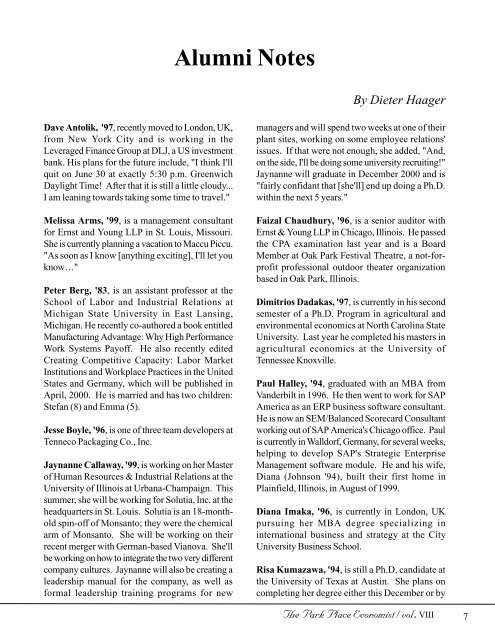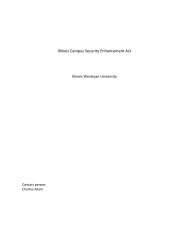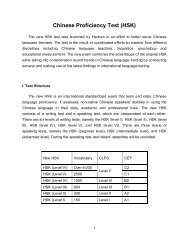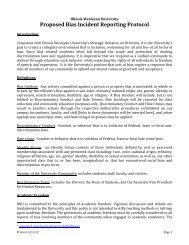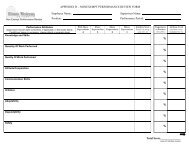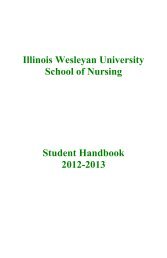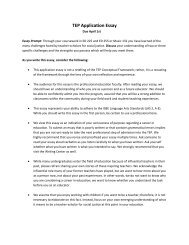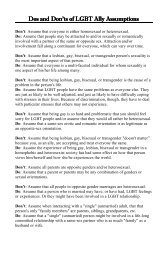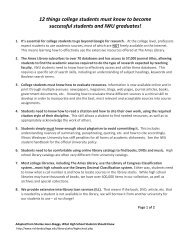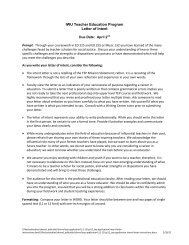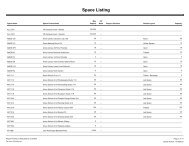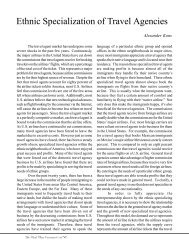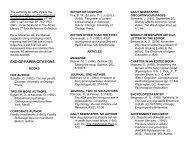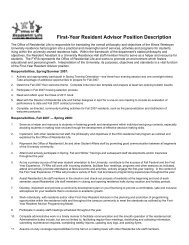Alumni Notes - Illinois Wesleyan University
Alumni Notes - Illinois Wesleyan University
Alumni Notes - Illinois Wesleyan University
You also want an ePaper? Increase the reach of your titles
YUMPU automatically turns print PDFs into web optimized ePapers that Google loves.
Dave Antolik, '97, recently moved to London, UK,<br />
from New York City and is working in the<br />
Leveraged Finance Group at DLJ, a US investment<br />
bank. His plans for the future include, "I think I'll<br />
quit on June 30 at exactly 5:30 p.m. Greenwich<br />
Daylight Time! After that it is still a little cloudy...<br />
I am leaning towards taking some time to travel."<br />
Melissa Arms, '99, is a management consultant<br />
for Ernst and Young LLP in St. Louis, Missouri.<br />
She is currently planning a vacation to Maccu Piccu.<br />
"As soon as I know [anything exciting], I'll let you<br />
know…"<br />
Peter Berg, '83, is an assistant professor at the<br />
School of Labor and Industrial Relations at<br />
Michigan State <strong>University</strong> in East Lansing,<br />
Michigan. He recently co-authored a book entitled<br />
Manufacturing Advantage: Why High Performance<br />
Work Systems Payoff. He also recently edited<br />
Creating Competitive Capacity: Labor Market<br />
Institutions and Workplace Practices in the United<br />
States and Germany, which will be published in<br />
April, 2000. He is married and has two children:<br />
Stefan (8) and Emma (5).<br />
Jesse Boyle, '96, is one of three team developers at<br />
Tenneco Packaging Co., Inc.<br />
Jaynanne Callaway, '99, is working on her Master<br />
of Human Resources & Industrial Relations at the<br />
<strong>University</strong> of <strong>Illinois</strong> at Urbana-Champaign. This<br />
summer, she will be working for Solutia, Inc. at the<br />
headquarters in St. Louis. Solutia is an 18-monthold<br />
spin-off of Monsanto; they were the chemical<br />
arm of Monsanto. She will be working on their<br />
recent merger with German-based Vianova. She'll<br />
be working on how to integrate the two very different<br />
company cultures. Jaynanne will also be creating a<br />
leadership manual for the company, as well as<br />
formal leadership training programs for new<br />
<strong>Alumni</strong> <strong>Notes</strong><br />
By Dieter Haager<br />
managers and will spend two weeks at one of their<br />
plant sites, working on some employee relations'<br />
issues. If that were not enough, she added, "And,<br />
on the side, I'll be doing some university recruiting!"<br />
Jaynanne will graduate in December 2000 and is<br />
"fairly confidant that [she'll] end up doing a Ph.D.<br />
within the next 5 years."<br />
Faizal Chaudhury, '96, is a senior auditor with<br />
Ernst & Young LLP in Chicago, <strong>Illinois</strong>. He passed<br />
the CPA examination last year and is a Board<br />
Member at Oak Park Festival Theatre, a not-forprofit<br />
professional outdoor theater organization<br />
based in Oak Park, <strong>Illinois</strong>.<br />
Dimitrios Dadakas, '97, is currently in his second<br />
semester of a Ph.D. Program in agricultural and<br />
environmental economics at North Carolina State<br />
<strong>University</strong>. Last year he completed his masters in<br />
agricultural economics at the <strong>University</strong> of<br />
Tennessee Knoxville.<br />
Paul Halley, '94, graduated with an MBA from<br />
Vanderbilt in 1996. He then went to work for SAP<br />
America as an ERP business software consultant.<br />
He is now an SEM/Balanced Scorecard Consultant<br />
working out of SAP America's Chicago office. Paul<br />
is currently in Walldorf, Germany, for several weeks,<br />
helping to develop SAP's Strategic Enterprise<br />
Management software module. He and his wife,<br />
Diana (Johnson '94), built their first home in<br />
Plainfield, <strong>Illinois</strong>, in August of 1999.<br />
Diana Imaka, '96, is currently in London, UK<br />
pursuing her MBA degree specializing in<br />
international business and strategy at the City<br />
<strong>University</strong> Business School.<br />
Risa Kumazawa, '94, is still a Ph.D. candidate at<br />
the <strong>University</strong> of Texas at Austin. She plans on<br />
completing her degree either this December or by<br />
The Park Place Economist / vol. VIII 7
8<br />
May 2001. Her fields are labor economics,<br />
econometrics, and monetary theory.<br />
Bryan C. McCannon, '98, is working on his Ph.D.<br />
in Economics at Pennsylvania State <strong>University</strong>. He<br />
recently took his candidacy exams over Christmas<br />
Break (1999). He has just started fieldwork and is<br />
studying Game Theory and Industrial Organization,<br />
specifically mechanism design and strategic<br />
interaction between firms. He will remain at Penn<br />
State studying for the next three years.<br />
Matt Mikulcik, '97, started a new job in August as<br />
a Statistician at Experian in Schaumburg, <strong>Illinois</strong>.<br />
He is also back at school on a part-time basis and is<br />
enrolled in the MS in Applied Statistics program at<br />
DePaul <strong>University</strong>.<br />
Kara Rocheleau, '95, recently got her MBA at<br />
Dartmouth College. She is currently working for<br />
General Mills as an assistant marketing manager,<br />
working specifically on new products in the 'Big G'<br />
cereal division.<br />
Brett Roush, '97, is living in Palatine, <strong>Illinois</strong>, and<br />
is an actuarial assistant at Trustmark Insurance<br />
Company in Lake Forest, <strong>Illinois</strong>. Recent exciting<br />
events include "making it through annual statement<br />
work without perishing; reading a really good book<br />
The Park Place Economist / vol. VIII<br />
called River God, and celebrating Christmas in our<br />
house (with a fireplace) instead of in a rented<br />
dwelling. (Ok, I admit it's largely the bank's house<br />
but it's still an improvement over renting!)" Brett<br />
plans to do some traveling soon, "rather than putting<br />
off neat vacations until retirement." He also plans<br />
to continue working on his world coin collection.<br />
Ossi Saarinen, '94, received an MBA from Purdue<br />
<strong>University</strong> in 1997. He is currently a Product<br />
Manager at United Technologies-Carrier<br />
Corporation.<br />
Ming Sun Wan, '96, is currently working for the<br />
largest listed Singapore broker, Vickers Ballas<br />
(USA) Inc., based in New York City. He is living<br />
and working in New York City.<br />
Gnanika (Suriarachchi) Wijayaratne, '94, is<br />
currently in College Station, Texas, attending<br />
graduate school at Texas A&M <strong>University</strong>. She will<br />
be graduating with an MS in Educational Human<br />
Resource Development in May 2000, and an MS<br />
in Human Resource Management in May 2001.<br />
Gnanika also recently got married in July 1998. She<br />
stated, "Not much else to report here… I'm just<br />
looking forward to finishing up school in the near<br />
future."
Otis Carter is an economics and business<br />
administration double major from Gurnee, IL. His<br />
senior project looked at the effects of<br />
macroeconomic indicators on foreign direct<br />
investment flows. After graduation he will enroll<br />
in Vanderbilt <strong>University</strong>'s joint JD/PhD program in<br />
economics. His dream job would be an attorney<br />
specializing in corporate or international law or an<br />
associate for a major consulting firm. His most<br />
memorable moment was "handing in the final draft<br />
of my senior project."<br />
Dieter Haager is an economics major and<br />
accounting minor from Springfield, IL. His senior<br />
project analyzed the causes of the wage gap between<br />
men and women after several years in the labor<br />
force. After graduation he will work in the audit<br />
division for Arthur Andersen in Chicago. His ideal<br />
job would be working for a major consulting firm<br />
while owning his own restaurant. His most<br />
memorable moment was "printing out the final copy<br />
of my senior project."<br />
Sunil Jagwani is an economics and computer<br />
science double major with a math and business<br />
administration double minor from Jodhpur, India.<br />
His senior project studied the impact of various<br />
macroeconomic factors on the supply and demand<br />
of venture capital in the United States. After<br />
graduation he will be an Investment Banking<br />
Analyst at Prudential Securities.<br />
Kris Kaneta is an economics and business<br />
administration double major born in Honolulu,<br />
Hawaii, while also having resided in Southeast Asia.<br />
His senior project looked at how various<br />
macroeconomic conditions and shocks altered<br />
international stock returns in comparison to other<br />
nation's stock returns. After graduation he will work<br />
for Norwest Financial as a Credit Manager in<br />
Northern Chicago. His ideal job would be to travel<br />
The Class of 2000<br />
By Otis Carter<br />
the world and teach the law of one price, the Big<br />
Mac theory taught by Dr. Stumph. His most<br />
memorable moment was "the late nights revising<br />
with Nate and the rest of the Park Place staff, who<br />
like me, were just in it for the free pizza."<br />
Peter Karlis is an economics and risk management<br />
double major from Naperville, IL. His senior project<br />
offered an explanation of IPO underpricing. After<br />
graduation he plans to get his law and MBA degree<br />
from Loyola <strong>University</strong>. His ideal job is real estate<br />
development. His most memorable moment was<br />
bridging the gap between the Economics and<br />
Business departments at his advanced research<br />
proposal defense. "It made me feel like I really had<br />
a good understanding of what each major had taught<br />
me."<br />
Tom Kirkwood is an economics and risk<br />
management double major from Bloomington, IL.<br />
His senior project dealt with the importance of<br />
human capital in escaping poverty. His ideal job<br />
would be to become an investment analyst. His most<br />
memorable moment was "Pat Holly (last year's<br />
technical editor for the Park Place Economist) trying<br />
to fight off apathy and teach me PageMaker at the<br />
same time."<br />
Alex Kons is an economics major with a history<br />
minor from Crystal Lake, IL. His senior project<br />
tried to find a plausible economic reason for why<br />
such drastic airfare differences exist. His dream job<br />
entails being an international airline captain on the<br />
Boeing 777. His two most memorable days were<br />
when Dr. Seeborg agreed that he had found an<br />
effective way to model his hypothesis and when he<br />
handed in his senior project.<br />
Elizabeth Kowalski is an economics and business<br />
administration double major from Chicago, IL. Her<br />
senior project looked at the determinants of<br />
The Park Place Economist / vol. VIII 9
10<br />
economic growth in East Asia. Specifically, she<br />
examined how outward orientation, government<br />
intervention, and macroeconomic stability could<br />
explain this growth. "Ultimately, I found out that it<br />
was a combination of all three of these factors that<br />
led to such success in the region," says Kowalski.<br />
If she doesn't find a job she likes after graduation<br />
she will attend graduate school next fall to get her<br />
MBA. Her dream job would be one that would<br />
allow her to travel the world and have time to enjoy<br />
it. As an economics major she has really enjoyed<br />
working on the UAUJE because she has had the<br />
opportunity to read undergraduate research from all<br />
over the world.<br />
Jason Lewis is an economics and political science<br />
double major from Algonquin, IL. His senior project<br />
measured the factors that influence foreign direct<br />
investment in lesser-developed countries. After<br />
graduation he plans to work at Pricewaterhouse<br />
Coopers. His dream job is to become a rock<br />
musician. His most memorable moment as an<br />
economics major is "coming in half an hour late to<br />
my international finance final and rocking the test."<br />
Robin Meers is a physics and economics double<br />
major from Moline, IL. Her senior project focused<br />
on the Environmental Kuznets Curve which is the<br />
relationship between economic development and<br />
pollution of a country. After graduation Meers plans<br />
to attend dental school in <strong>Illinois</strong>.<br />
The Park Place Economist / vol. VIII<br />
Nate Taulbee is an economics and business<br />
administration double major from Taylorville, IL.<br />
His senior project assessed the impact of economic<br />
factors (such as interest rates, inflation expectations,<br />
real GDP, and unemployment) on the stock market.<br />
After graduation he will work as a Financial<br />
Business Analyst for State Farm. His dream job<br />
would be to become a part of the Dallas Cowboys<br />
management. He also enjoys the stock market and<br />
would like to become an Investment Analyst. His<br />
most memorable moment was watching Dr. Leekley<br />
and Dr. Seeborg crazy bowl during a cosmic bowling<br />
event hosted by the Economics' Society.<br />
Alva Winfrey is an economics and sociology double<br />
major from Chicago, IL. Her senior project<br />
examined the effects of high-rise housing projects<br />
in Chicago on residents in surrounding<br />
neighborhoods. After graduation she plans to attend<br />
graduate school in Chicago and work in the social<br />
service industry. Her most memorable moment was<br />
when she took the Economics of Race and Gender<br />
May term course which opened her mind to the<br />
problems that women, the poor, and minorities face.
The Bob and Rob Show<br />
Once again the Bob and Rob Show, a<br />
simulated talk radio show, came to <strong>Illinois</strong> <strong>Wesleyan</strong><br />
to educate students on money and banking issues.<br />
The hosts of this information-packed "radio show"<br />
were <strong>Illinois</strong> <strong>Wesleyan</strong> alumni Rob Fazzini and<br />
<strong>Illinois</strong> <strong>Wesleyan</strong>'s Director of <strong>University</strong><br />
Communications Bob Aaron. Fazzini currently<br />
serves as an advisor for the American Bankers<br />
Association and is also President of Busey Bank in<br />
Bloomington.<br />
Fazzini and Aaron discussed credit cards,<br />
bankruptcy, options for home-buyers, and today's<br />
banking privacy. During this dialogue both fielded<br />
questions from the "studio audience" with the help<br />
of the roving broadcast journalist, Dr. Michael<br />
Seeborg.<br />
The duo first tackled a question on credit<br />
cards. Aaron asked Fazzini which credit card is<br />
best for a college student or a recent graduate, since<br />
there are over 1.4 billion credit cards in use<br />
worldwide.<br />
"There are over 6,000 credit card issuers,<br />
so there are a few factors that must be considered<br />
when deciding which credit card to use," Fazzini<br />
responded. These factors range from interest rates<br />
and annual fees to the purchaser's ability to make<br />
on-time payments.<br />
Fazzini also stated that the cardholder's<br />
maturity is an underlying issue when deciding on a<br />
credit card company. Quoting Virginia Dean,<br />
Executive Director of Communications for the<br />
American Bankers Association, Fazzini asked, "Is<br />
a person who is old enough to drive or enlist, or to<br />
become a parent, or to read the Star Report too<br />
irresponsible to pay his or her bills? Probably not."<br />
However, Fazzini noted that if the user is<br />
not mature enough to have a credit card, he could<br />
eventually experience personal bankruptcy. There<br />
By Adam Palmer<br />
were a total of 1.3 million personal bankruptcies<br />
filed in 1999 alone, which is a rather alarming figure<br />
for the issuers of credit cards. Fazzini pointed out<br />
that divorce, loss of a job, sudden medical bills, or<br />
just the lack of responsibility by a credit card user<br />
are common causes of personal bankruptcy.<br />
Legislation passed on February 2, 2000,<br />
introduced a new needs-based bankruptcy law that<br />
requires bankrupt filers to pay back outstanding<br />
debts when they possess the funds to do so. The<br />
idea behind the law is to discourage people that take<br />
expensive worldly trips, charge it all to their credit<br />
card, and declare bankruptcy after the trip in order<br />
to avoid paying the credit card company.<br />
Aaron and Fazzini then discussed home<br />
loans and mortgage purchasing. Aaron asked about<br />
options for new home buyers and what time lengths<br />
and interest rates are the most beneficial. Fazzini<br />
explained the 15 and 30-year mortgage loan with<br />
either fixed or variable rates. Fazzini believes the<br />
15-year loan is more enticing because the interest<br />
rate is typically a half of a percentage point less than<br />
the 30-year rate, which allows a borrower to save<br />
significant amounts of money over time.<br />
"On a 15-year loan at $100,000, in today's<br />
market, the amount paid back would be $197,000,<br />
and in thirty years the amount paid back would be<br />
$329,000," Fazzini commented.<br />
The Bob and Rob Show offered its audience great<br />
advice on several hot money and banking issues.<br />
Perhaps the most useful advice came from Fazzini<br />
in the discussion on personal privacy.<br />
"While doing a transaction, don't leave<br />
receipts or any other personal information lying<br />
around. It doesn't take long for a person to make a<br />
note of your Social Security number or account<br />
number."<br />
The Park Place Economist / vol. VIII 11
12<br />
Durbal Becomes Newest Addition to<br />
the Department<br />
After living in such exotic locales as Fiji and<br />
Pakistan, how does someone end up in Bloomington,<br />
<strong>Illinois</strong>? This is one question frequently asked of<br />
<strong>Illinois</strong> <strong>Wesleyan</strong> <strong>University</strong>'s newest addition to the<br />
Economics Department, Dr. Ilaria Ossella-Durbal.<br />
When questioned why exactly she chose IWU, we<br />
economists can only expect to hear that the benefits<br />
of her decision exceeded the costs.<br />
A small university does draw many faculty<br />
and students who seek personal attention and a studious<br />
environment. But how could the calm, languid<br />
atmosphere of IWU compete with the excitement<br />
of global travel? While she was growing up,<br />
Ossella-Durbal's father served in the United Nations<br />
Development Program, traveling in underdeveloped<br />
countries and establishing programs for enhancing<br />
economic factors ranging from education to agriculture.<br />
The Ossella family spent only 2-3 years in<br />
each country, and Durbal resided in Fiji, Pakistan,<br />
South Korea, Malaysia, Thailand, and Burundi. As<br />
a result of her extensive travels, Durbal is trilingual<br />
-speaking English, French, and Italian, her father's<br />
native language.<br />
Influenced by her father's work from a<br />
young age, Durbal pursued a Bachelor of Arts Degree<br />
in both Economics and Mathematics from<br />
Cornell <strong>University</strong> in Ithaca, New York. She returned<br />
to Cornell for graduate studies and recently<br />
earned her Ph.D. in August, 1999. She followed<br />
her international interests and researched the<br />
economy of India, focusing on identifying the leading<br />
sectors in the Indian economy that would accelerate<br />
"the turnpike growth factor" the most. Representative<br />
sectors included agriculture, infrastructure,<br />
and manufacturing. Analysis was performed using<br />
micro-economic tools such as a Turnpike Property<br />
and an Input Requirement Matrix. Through model<br />
The Park Place Economist / vol. VIII<br />
By Babs Marcus<br />
usage and data manipulation, Durbal was able to<br />
support her thesis. She found that the growth rate<br />
of optimal output for all sectors converge in the long<br />
run to a common value.<br />
Durbal then identified the sectors for which<br />
an improvement in productivity generated the greatest<br />
increase in long-run growth. “From this, we were<br />
able to establish the importance of infrastructure in<br />
the Indian economy," says Durbal. The significance<br />
of her studies is vital to such countries as India,<br />
which has opened up her borders since 1990 in a<br />
continuing attempt to become a world power.<br />
Durbal's contributions to the Economics department<br />
at IWU stem from her educational experience<br />
as well as her travels. This year alone she<br />
taught International Trade, Development,<br />
Microeconomics, and Statistics. She adjusts well<br />
to almost any atmosphere, including the private<br />
environment at <strong>Illinois</strong> <strong>Wesleyan</strong>. As a young student,<br />
Durbal frequently moved around between international<br />
schools.<br />
"We found it easy to integrate as international<br />
students. People were very open to us and no one<br />
was concerned exactly what clique we fit into because<br />
we were all in the same situation."<br />
Durbal's openness and friendliness are apparent<br />
while conversing with her, and have already<br />
earned her a positive reputation among students.<br />
"Her enthusiasm for what she does becomes contagious,<br />
and after just one class with her you feel comfortable<br />
enough to ask the most complicated questions"<br />
states statistics student Tricia Blachinsky.<br />
Dr. Durbal is optimistic about her career<br />
at <strong>Illinois</strong> <strong>Wesleyan</strong>. Her strong economic background,<br />
as well as her travel experience, characterizes<br />
her as a diverse contributor to the Economics<br />
department.
The Econ Department is on the Web<br />
Dr. Margaret Chapman created the first economics<br />
website a few years ago when the Department<br />
was still located on Park Place. Two years<br />
ago, Dr. Robert Leekley updated the site to its current<br />
format and decided to hire a student webmaster<br />
to manage and update the site. Patrick Holly '99<br />
was the first student webmaster and was responsible<br />
for adding the background, other graphical aspects<br />
of the site, and the Keynes quote on the homepage.<br />
This year, Tom Kirkwood took over as<br />
webmaster and created links, containing course descriptions,<br />
within the course schedule. He also installed<br />
a counter on the homepage and made the<br />
link buttons glow with the touch of a mouse. Under<br />
Kirkwood's guidance, the website has grown<br />
significantly.<br />
"I estimate that there are approximately three<br />
times as many files that take up about twice as much<br />
space," says Kirkwood. "The web page that you see<br />
has not expanded quite as much though. A lot of<br />
the electronic increases in size was from incorporating<br />
JavaScript into the page, and using pop-up<br />
windows for course descriptions and professor information."<br />
In addition to his other improvements,<br />
Kirkwood also made the alumni page searchable<br />
by the alumni's last name or graduation year.<br />
The Department homepage is simply an introduction<br />
to the site, with a quote from John<br />
Maynard Keynes and contact information for the<br />
department. One of the links from the homepage is<br />
the faculty site containing email addresses and background<br />
information about the econmics professors.<br />
Dr. Leekley has a link to his homepage, which features<br />
his contact information, along with his course<br />
schedule for the 1999-2000 school year. There are<br />
also links to pages devoted to Dr. Leekley's classes.<br />
Each of these pages includes course requirements,<br />
grading information, and syllabi listing when specific<br />
assignments are due.<br />
Another highlight of the Department site is the<br />
By Katie Hampson<br />
"Courses" link, where students can find the course<br />
schedule for classes during the current school year<br />
and also the 2000-2001 school year. Within these<br />
schedules, each class can be selected to display a<br />
pop-up window containing that course's description.<br />
The "Courses" section also lists the requirements<br />
for an economics major and minor.<br />
The "Students" section of the website contains<br />
a list of all current econ majors by year. In<br />
addition, there is a link to The Economics Society<br />
site, where you can find the current executive board<br />
members, a list of programs for this year, and general<br />
information about the organization. Another<br />
part of the student section is the Delta Omicron<br />
Epsilon page, where you can find a list of all the<br />
initiates to the honor society since 1990. There is<br />
also a link to The Park Place Economist, which provides<br />
access to all past editions of the journal, and<br />
to The <strong>University</strong> Avenue Undergraduate Journal<br />
of Economics. The final link in the student section<br />
is the "Student Research" page, which features a<br />
listing of individual student research projects from<br />
1990 to the present.<br />
In the alumni section, alumni have the opportunity<br />
to share news, or exchange email addresses,<br />
with their former classmates. This section is an<br />
excellent resource for career networking and for<br />
keeping in contact with old friends. The alumni list<br />
is not complete, however, and all alumni are encouraged<br />
to email the webmaster or Dr. Leekley<br />
with their current information. The alumni page is<br />
searchable by last name or graduation year.<br />
The website also contains links to economic<br />
data and research resources. For example, there is<br />
a link to www.economicsresearch.com and to the<br />
Bureau of Labor Statistics site. Another popular link<br />
is the Federal Reserve Economic Data (FRED)<br />
Database.<br />
The Economics website is an excellent resource<br />
for students, alumni, or anyone interested in<br />
finding out about the Economics Department. As<br />
The Park Place Economist / vol. VIII 13
14<br />
the site continues to grow, Dr. Leekley hopes to add<br />
more individual professors' pages, and to keep<br />
alumni and Economics Society information current.<br />
Eventually students will access faculty pages to find<br />
The Park Place Economist / vol. VIII<br />
out office hours and assignment information. The<br />
website can be accessed either on or off campus, so<br />
if you haven't done so yet, come check us out at<br />
http://titan.iwu.edu/~econ.


